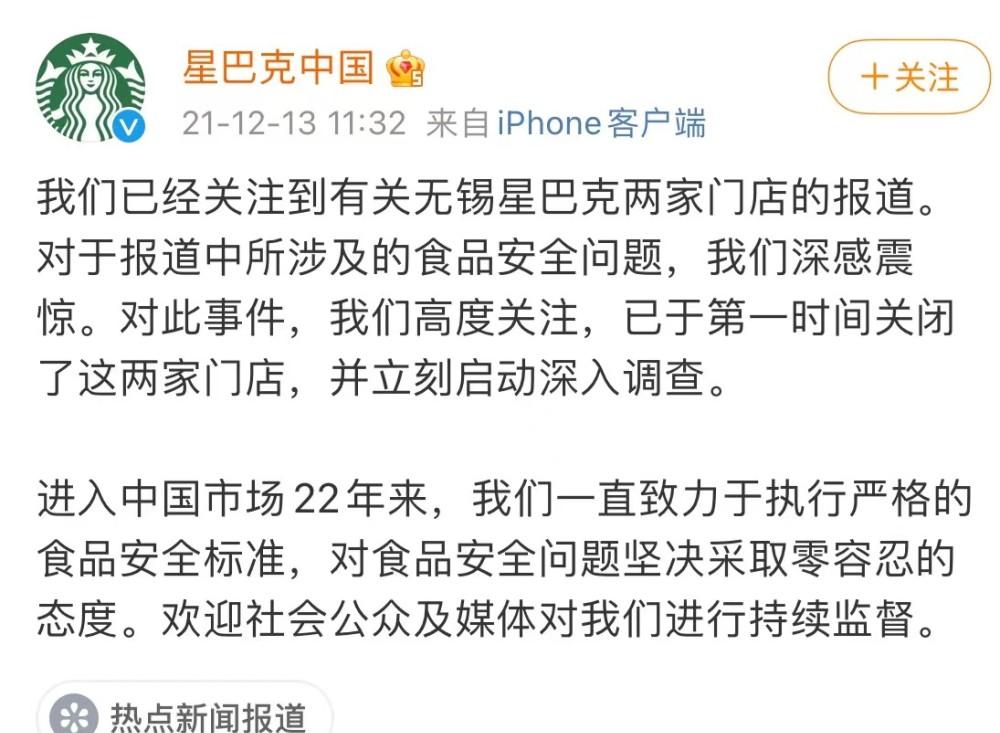
On December 13, Starbucks was exposed to food safety problems. According to the Beijing News, the reporter recently went undercover in the Starbucks Wuxi Changxing Building Store and the Wuxi Zhenze Road Store. Judging from the disclosed video, Starbucks has the problem of using expired raw materials, including chocolate liquor, matcha liquid, cream, peach pulp, etc.; in addition, there are also behaviors such as store staff tearing off expired raw material labels, tampering with the shelf life of raw materials, and overnight cakes still on the shelves. The supervisor of one of the stores even asked the undercover reporter to use the bar towel to wipe the outer wall of the garbage can, and after a simple cleaning, it was continued to be used at the bar. Starbucks China responded today that it was deeply shocked by the food safety issues involved in the report, and had closed the two stores involved at the first time and immediately launched an in-depth investigation.
The "taste" of the stinky meat sausage in RT-Mart has not yet dissipated, the fat brothers and the meat crab pot use the "diaphragm" of dead crabs is still in the chest, and another well-known catering brand has made many consumers have a big appetite. As an international chain coffee giant, Starbucks is almost not in the same order of magnitude as the companies that have recently appeared on the "black list" of food safety in terms of the number of stores or popularity. Such a large brand, with so many customer groups, and the price of goods is recognized as not cheap, there are also problems of poor raw material hygiene and irregular operation of employees, which also shock consumers. The Starbucks "big rollover" incident has once again "educated" consumers: expensive is not necessarily good, and chains are difficult to lock in food safety; although consumers have a high percentage of impression of big brands, some big brands do not have a high degree of sincerity to consumers.
"Scrapped, even if it's money in the store." In the video of the reporter's secret visit, a starbucks store clerk told the truth and said that he was reluctant to throw away the mystery of expired ingredients. Secretly use expired ingredients to make drinks, pass on this cost to consumers, after the matter is exposed, what is lost is the trust of more diners, stores and even brands have to pay for their credibility, is this deal earned or lost? Looking at Starbucks' response, I was "shocked" by the "small actions" of the two Wuxi stores; after the "shock", did you reflect on whether there were any health rules in the stores involved, and did the clerks have any instructions on the operation? As the clerk said, who made the rules for "scrapping and counting money" for food, and is there a problem of orientation? The store clerk was tampered with by "words and deeds", is this a unique "tradition" of the store involved, or is it a "secret recipe" that many stores do not know?
Food safety is the bottom line that enterprises cannot touch, and it is a legal red line that cannot be crossed. Food safety needs to be guaranteed from supervision to system, and it needs to be awe from the heart of employees at all levels of the catering industry, rather than shouting "shock" after the accident and pushing the responsibility on individual employees, but to plug loopholes in the system. On the road to regulating food safety, government supervision will only become more and more stringent, media supervision will only become more and more in-depth, if there are still enterprises or employees trying to exploit loopholes, bent on drilling money, it is insisting on entering the penalties formulated by the law and entering the blacklist of consumers voting with their feet.
Source Beijing Evening News | Reporter Xin Yin
Edit Singing
Process Editor Wu Yue